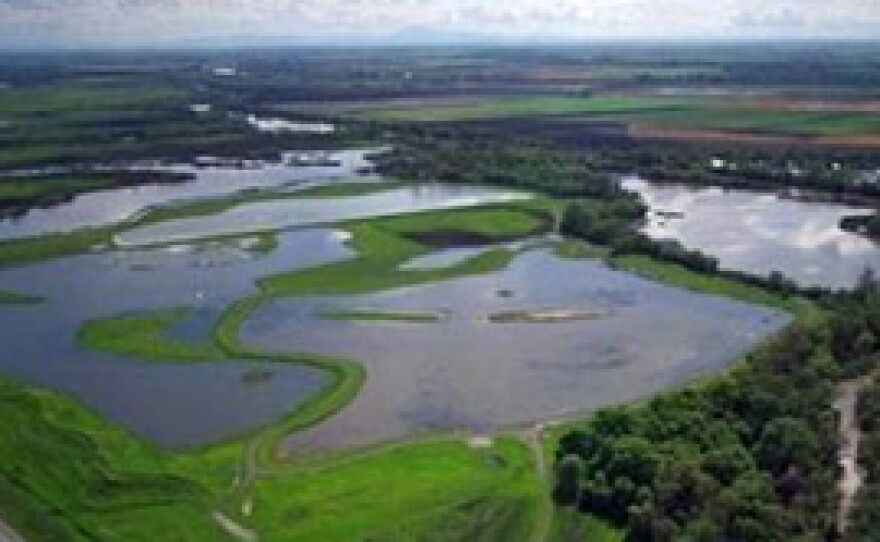(Photo: An aerial view of the Sacramento-San Joaquin River Delta region in northern California. A court ruling aimed at protecting the endangered delta smelt fish forced cities, including San Diego to find new sources of water. Online NewsHour )
San Diego Mayor Jerry Sanders and a coalition of business, labor, environmental and other leaders say California's water supply is at the tipping point. The group is urging the state legislature to put a water bond measure on next November's ballot. KPBS Environmental Reporter Ed Joyce has details.
Sanders says California is in a water crisis and a water bond is vital to fixing the state's water supply problems.
Sanders: We need to create a diverse and sustainable portfolio of water supply resources that provides stable sources of water throughout the state. This bond does that by providing money to fix the Delta, create storage, clean groundwater and fund regional water supply projects.
Sanders says because San Diego County is at the end of California's water system, it's vulnerable to drought and reduced supplies from Northern California.
He says the water bond measure proposed by Governor Schwarzenegger and Senator Dianne Feinstein is a good starting point.
Sanders: For years water experts have been predicting and warning what might happen if we didn't start investing more in our water system. We're at that tipping point. We either move forward with a sound water investment strategy or we risk serious consequences to the economy and the environment.
Fern Steiner is Board Chair of the San Diego County Water Authority. She says restrictions on pumping from the State Water Project have reduced water deliveries to San Diego County.
Steiner says those cutbacks are hurting the county's agriculture industry.
Steiner: Thousands of farmers in our county have had their supplies cut by up to 30 percent. They are stumping avocado trees and cutting production to cope.
She echoed Sanders support for the water bond measure.
Steiner: Any solution must include restoring water supply reliability and the ecosystem of the Bay Delta which is the source of one-third of our region's water.
Many of the Delta's native fish populations are in rapid decline and its levees are aging. Those fragile levees are subject to increasing water pressure from tides and floods. A major earthquake would cause a catastrophic failure of the levee system.
Kathy Viatella is Senior Project Director with The Nature Conservancy.
Viatella: I think we can all agree that California is facing a water crisis and that the situation is dire and we need to take action now. The crisis is not only affecting our drinking water but our food supplies, our rivers and our streams and the fish and wildlife they support. And ultimately the communities ability to thrive.
San Diego Regional Chamber of Commerce Board Chair Phil Blair says water is the lifeblood of the region's economy.
Blair says getting a bond measure on the ballot now will save dollars later.
Blair: If we don't take concrete steps now to ensure an adequate water supply the results will be job losses, closed businesses and a weak economy.
The water problems are already affecting the state's economy.
The group says thousands of acres of Central Valley crops have been left in the fields and economic damages from crop losses could surpass $100 million.
Timothy Quinn is the Executive Director of the Association of California Water Agencies.
Quinn: And from one end of this state to the other something is clear. This is the worst water crisis this state has experienced since the projects, the big projects, were built back in the mid-20th century.
Widespread water rationing is a possibility next year even if a bond measure makes the ballot and is approved by voters.
And a two-year dry spell in the state has already caused mandatory rationing in some cities.
The group says without a fix of the state's water infrastructure the environment, economy and quality of life in California will suffer.
But it's up to the state legislature to agree on a water bond measure.
And, at the moment, the Governor and the legislature are still wrestling with the state budget.
Ed Joyce, KPBS News.







